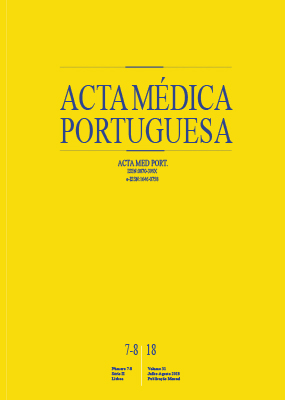How is Bariatric Surgery Improving the Quality of Life of Obese Patients: A Portuguese Cross-Sectional Study
DOI:
https://doi.org/10.20344/amp.9133Keywords:
Anxiety, Bariatric Surgery, Depression, Obesity/surgery, Obesity, Morbid/surgery, Quality of LifeAbstract
Introduction: Obesity is often accompanied by psychological distress and both can reduce patients’ quality of life. Bariatric surgery is proven to be a good method to reduce weight and to alleviate comorbidities, leading ultimately to an improvement in quality of life.
Material and Methods: The authors studied 80 patients enrolled in the Multidisciplinary Bariatric Unit of a central hospital in Porto, Portugal. Patients submitted to Roux-en-Y gastric bypass and sleeve procedures were compared. Laboratory parameters were collected from patients’ files. Quality of life and psychological state - depression and anxiety, were evaluated using the Portuguese versions of the Medical Outcomes Study SF-36 and the hospital anxiety and depression scale, respectively, within one to two years of the surgery.
Results: A total of 51 patients were operated and completed a quality of life evaluation, while 21 patients were in a pre-operatory group (control). Patients subjected to bariatric surgery had higher scores of SF-36 and lower scores in both hospital anxiety and depression scale (anxiety and depression) subscales (p < 0.001); SF-36 presented a Pearson correlation coefficient of 0,475 (p = 0.004) with hemoglobin A1c. Sleeve had better results in the hospital anxiety and depression scale-depression subscale (p = 0.073).
Discussion: In this population, bariatric surgery led to better results, regarding both metabolic and psychological evaluations. No significant differences were found between gastric bypass and sleeve. However, further analyses must be performed.
Conclusion: This study supports the theory that bariatric surgery contributes to the improvement of obese patients’ quality of life and psychological state.
Downloads
Downloads
Published
How to Cite
Issue
Section
License
All the articles published in the AMP are open access and comply with the requirements of funding agencies or academic institutions. The AMP is governed by the terms of the Creative Commons ‘Attribution – Non-Commercial Use - (CC-BY-NC)’ license, regarding the use by third parties.
It is the author’s responsibility to obtain approval for the reproduction of figures, tables, etc. from other publications.
Upon acceptance of an article for publication, the authors will be asked to complete the ICMJE “Copyright Liability and Copyright Sharing Statement “(http://www.actamedicaportuguesa.com/info/AMP-NormasPublicacao.pdf) and the “Declaration of Potential Conflicts of Interest” (http:// www.icmje.org/conflicts-of-interest). An e-mail will be sent to the corresponding author to acknowledge receipt of the manuscript.
After publication, the authors are authorised to make their articles available in repositories of their institutions of origin, as long as they always mention where they were published and according to the Creative Commons license.









